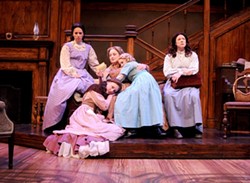Near the beginning of Little Women, Jo, an aspiring writer, hopefully submits a manuscript—to which she receives this disheartening, but maybe well-meaning, response: “My advice to you is to go home and have babies.”

- PHOTO BY LUIS ESCOBAR, REFLECTIONS PHOTOGRAPHY STUDIO
- THE MARCH FAMILY: The four March sisters—Meg (Sarah Girard, upper left), Beth (Renee Wylder, lower left), Amy (Brittney Monroe, lap), and Jo, (Karin Hendricks, far right)—and their mother (Elizabeth Stuart, center), receive a letter from a faraway Mr. March in PCPA’s Little Women, the Broadway Musical.
The second-oldest of the four March sisters in Louisa May Alcott’s Civil War-era novel, Jo pulls an exasperated face before shrugging off society’s prejudices as if they were but another stuffy rule to be gleefully broken in due time. We pity not the rejected, but the rejecter, for being afflicted by such outdated views when others have already evolved. Such moments make Little Women, Alcott’s partially autobiographical coming-of-age story, the enduring and relevant work that it is. Rather ironically, Alcott, like Jo, much preferred writing sordid, sensational “blood and guts” stories to the domestic tale of sisterhood that proved so popular. Little Women was Alcott being conventional, yet her progressive thoughts—and her wry observations of who women are versus who society thinks they should be—still feel modern, as if they were written about the era at a full century’s remove.
Most satisfyingly, Little Women, the Broadway Musical, currently staged at PCPA in Santa Maria, does justice to Alcott’s spirited characters, but also, through dramatic reenactments of Jo’s gothic thrillers, her more flamboyantly sinister literary leanings.
Karin Hendricks is Jo March, who we first encounter as an energetic tomboy. Her very presence clashes mightily with that of Professor Bhaer, who, in the wake of her short story’s rejection, advises her to flesh it out. (Andrew Philpot, as a reserved German immigrant, perfectly nails his character’s accent and mannerisms.)
But Jo is soon whisked away to the past and the idea of composing an operatic tragedy—full of death and glory—starring her sisters, to which all of Concord, Mass. would be invited.
Though the elegant, well-mannered Meg (Sarah Girard) is the oldest sister, Jo is clearly the ringleader of the four March girls. The sweet, softspoken, musically inclined Beth (Renee Wylder) is the peacemaker of the group. Amy (Brittney Monroe), the youngest sister and somewhat spoiled, longs for the privileges and, she imagines, glamour of being older.
We never see Mr. March, who is a colonel fighting in the Civil War. Instead, the girls’ mother, “Marmee” (Elizabeth Stuart), is the head of the household. Their Aunt March (an excellently cast Anna Ramero), stately, regal, and somewhat old-fashioned, tries to instill some ladylike values in the four girls, the reward for their success being a trip to Europe. Her attempts at grooming Jo for introduction into “society,” a word Jo scoffs at often, are only marginally successful. Marmee, however, is more lenient (more American, perhaps), encouraging her daughters to pursue their own interests, praising their individualism.
- ASTONISHING!: PCPA’s Little Women plays at Marian Theatre on the Allan Hancock College campus in Santa Maria through March 11 and at the Solvang Festival Theatre June 14 through July 1. Tickets cost $28, with student and senior discounts available. Visit pcpa.org or call the box office at 922-8313.
Unusually for a Broadway musical, the songs in Little Women (written by Jason Howland, with lyrics by Mindi Dickstein) are beautiful but surprisingly forgettable, evaporating off the stage without leaving a trace. Only one of them, a little ditty called “Off to Massachusetts,” which Beth plays on the piano, is remotely catchy at all. Sure, catchiness isn’t everything. But it’s safe to say the most memorable musicals are invariably the ones with choruses that get permanently lodged in your head. I could hum My Fair Lady, Rent, or Avenue Q years after seeing them onstage. Curiously, by the time I returned home after seeing Little Women, I hadn’t retained a single melody.
I do recall the cast having excellent singing voices, though they were sometimes nearly drowned out by the prerecorded orchestra that accompanied them. (Whenever a song seemed to be burgeoning beneath a given scene, it would always be preceded by the same mischievous little piano tinkle that would sneak in and punctuate the dialogue. You knew when you heard that sound there was a musical number approaching, like lightning before a rather banal storm.)
As it is Jo’s story that pushes the play forward, she sings approximately half the musical. We watch her grow from rambunctious, fiery teenager to a more subdued, but never truly conventional, adult. Hendricks nails the boyish recklessness of the younger Jo, who cuts down her neighbor’s tree without asking, hates being stuffed into fine dresses, punches people amiably, and challenges the neighbor boy Laurie (Scott Fuss) who clearly adores her, to races. But while Hendricks attacks the role with gusto, the reality of her more mature appearance makes it hard to accept that she’s just a teenager in the beginning.
A fabulous rotating set makes for easy scene changes, and perched on top of it, always visible, is the attic where Jo seeks solace and inspiration for her stories. She is determined never to marry, and, in the absence of her father, to provide for the family through her writing. When her aunt insists that “All girls marry,” Jo counters, “I’m not all girls.”
Men, it seems, can never break her heart. But when Amy, in a fit of jealousy, throws Jo’s unfinished novel into the fireplace, her anguish is palpable.
Arts Editor Anna Weltner would never destroy words. Contact her at [email protected].
Comments